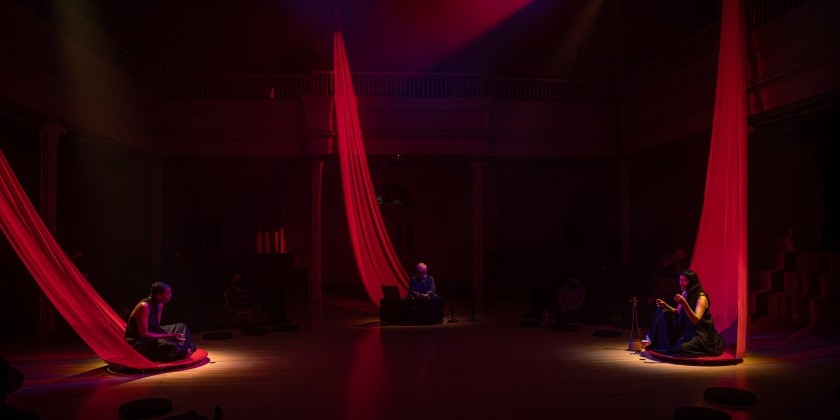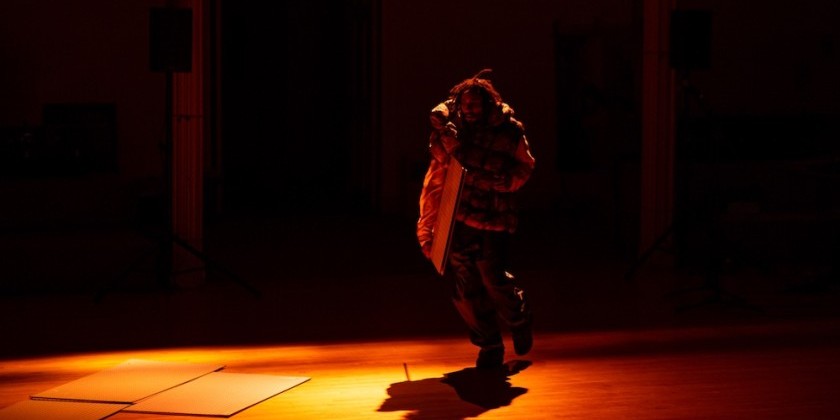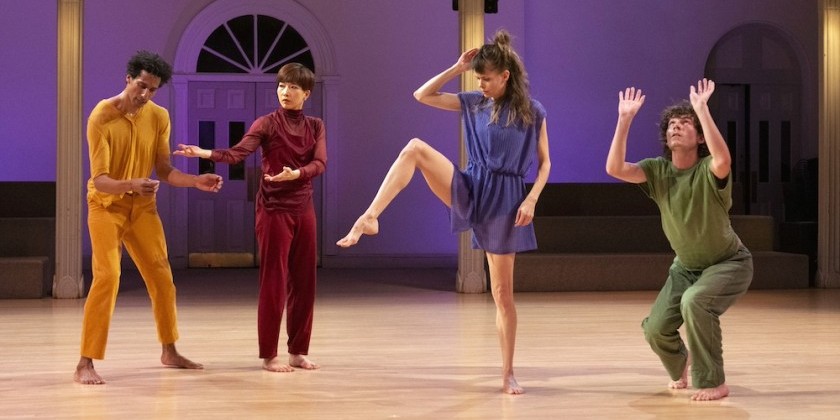IMPRESSIONS: Samita Sinha's "Tremor" at Danspace Project

A Cosmic Journey of Sound In collaboration with Sunil Bald, Ash Fure, and Okwui Okpokwasili
Samita Sinha’s Tremor
In collaboration with Sunil Bald, Ash Fure, and Okwui Okpokwasili
Lighting Designers: James Proudfoot (Vancouver) and Kathy Kaufmann (NYC)
Partner in Practice: Darrell Jones
Sound Engineer: Daniel Neuman
Danspace Project, St. Mark’s Church
November 9-11, 2023
Composer Simita Sinha, and choreographer Okwui Okpokwasili, sit with legs-folded upon round platforms below long swags of red fabric hung from the second floor of St. Mark’s Church. Ash Fure, sonic artist, plays electronic instruments under a third swag. The audience, tucked evenly between the performers in four groupings, quietly observes. The three award-winning performers remain seated for the 60-minute sound exploration created by Sinha. Entitled Tremor, traditional Hindustani vocal bandishes (Hindi compositions) and Indian folk music are deconstructed or “decreated,” until only energy is palpable.
Sinha has said that she attempts to journey through a “portal of infinite awareness to an open state of being.” The onlooker is invited to travel with her, but without expectation. Movement here is not physical but exists in the full-throated notes of the singers, and Fure's sound that runs around the space. Their performance of each tonality attempts to achieve a state of total awareness. Akin to meditation and ceremony, Tremor searches for purity of sound.

A lengthy silence attunes the performers and the audience to one another, and the environment. Forced to slow down, we breathe evenly and become aurally aware, ready to receive the music. The frenetic, technology-driven world, for a short time, is kept at bay. “One can only be there and not demand,” says Sinha, “It is a task to stay there and learn from that.” Sinha allows her senses to follow the resultant vibrations and somatically shape the sound.
Wearing a black dress that sweeps her ankles, Sinha plucks the ektara, a one-stringed Indian instrument that acts as an extension of her arm. She follows its resonating hum by singing a single, long note whose unfolding, clear pitch repeats several times. Her wavers and warbles resemble insects. Fure’s accompaniment fills the church and gently supports Sinha’s broad range and registers. Their duet expands and develops until a reprieve in inevitable. Neither joyful nor mournful, the sound, amplified by the apse, supports a palpable, moment-by-moment experience.

Seated across from Sinha, Okpokwasili establishes a subtle breath cycle. Her exhale echoes a small cough. When she inhales her fingers react until Sinha joins. Together their voices simulate the whirring wings of bumblebees that eventually becomes insistent wailing. Fure’s music, thumping heart-like layered with ominous clattering, bounces off the walls from different directions. Wind and thunder are sonically created as Kathy Kaufman’s lighting, hitherto softly illuminating, brightens. Volume escalates to a pitch, and then suddenly, the din ceases. As if the air has been cleansed by sound, we become aware of our shared journey. Okpokwasili’s eyes close as Sinha’s open. Each touch a finger to their hearts, place the other hand at their sides, and with a small smile acknowledge the other. The audience waits and watches, as the three performers rise without bowing, and exit. This cosmic journey was created for the inhabitants of the space, and the heavens.












